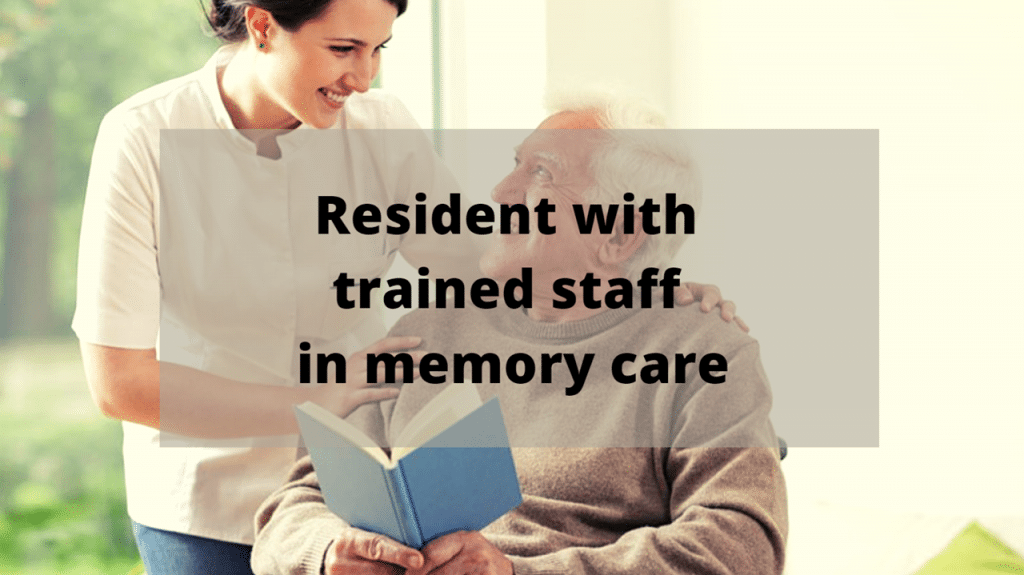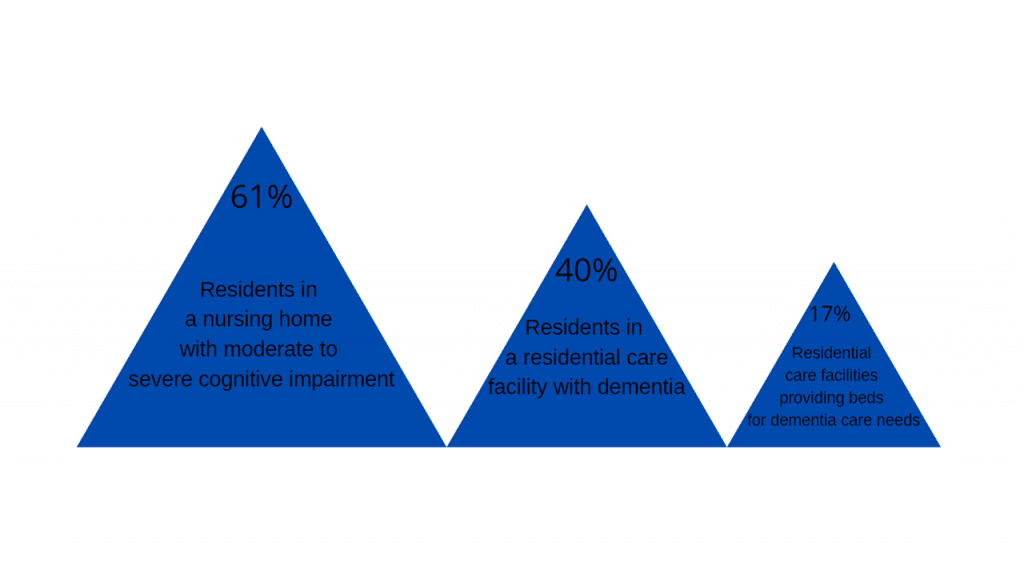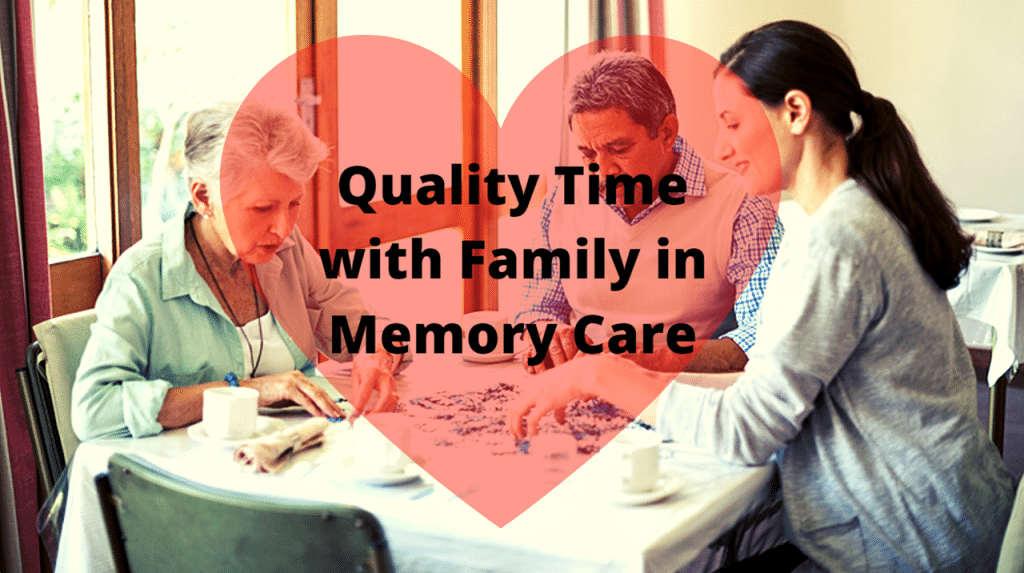Your Best Memory Care Homes in New Mexico
Your Best Memory Care Homes in New Mexico
Overview
According to the US Department of Health and Human Services, about 7 in 10 seniors will, at some point in their lives, need long-term care. In some estimates, almost 68% of seniors in nursing homes or residential care have cognitive impairment to some degree.

Resident with trained staff in memory care
What is memory care?
A memory care community is either a wing/unit of a residential care facility or a residential care facility that is specifically designed for people with Alzheimer’s disease or other dementias. Its goal is to provide personalized care that will lead to a high quality of life for residents while also reducing the symptoms such as depression, anger, aggression, and wandering.
Some nursing homes and assisted living facilities also have staff or medical teams specially trained to deal with people who have dementia. They may have a specific wing in the community for those residents. However, despite the prevalence of cognitive impairment, not all residential care facilities and nursing homes offer the same kind of care for people with dementia.
The US Department of Health and Human Services reported in 2017 the different percentages of nursing home and residential care facility residents with cognitive impairment and residential care facilities offering beds to address dementia care needs.

The US Department of Health and Human Services Reported in 2017
Despite the national data suggesting that over 60% and 40% of nursing home residents and residential care facility residents, respectively, in the USA have dementia, only about 17% residential care facilities offer beds to address dementia care needs. Moreover, the definition of a memory care from one state to another is not so consistent; thus, the Alzheimer’s Association encourages people who have a loved one suffering from dementia to advocate for consistent policy as regards memory care.
Basically, memory care communities provide a high quality of life for its residents while taking additional measures, such as putting security measures in place or locking some units so that residents can neither wander nor leave to ensure their safety. There are other communities as well that take a less formal approach to security, but they are securing the outside grounds so that no one can leave the property.
Memory care facilities also help your aging loved ones to manage their healthcare and medications by giving you the option of specialized care. They not only care for the residents’ medical needs; they also offer opportunities to engage in activities that work best for people with cognitive impairment. Some communities even offer activities that are known to be beneficial for people with cognitive changes, such as musical entertainment, therapy pets, or the opportunity to spend time in the gardens.
Things to know about memory care
Care for your aging loved one can come with a higher price. According to CareScout, monthly cost for care for aging adults ranges from $1,560 to $9,000—this is based on the data from 440 regions across the USA. Generally, dementia care is estimated to add an average of $13,000 annually to the expected costs for residential care. But the costs vary depending on the services needed as well as your location. Moreover, some facilities may not disclose additional charges for memory care upfront unless you personally inquire for them.
The good thing about living in a memory care unit is that it offers several benefits, including less use of antipsychotic medications and physical restraints for patients, less likelihood of tube feeding, improved medical care for other health issues, and of course higher quality of life for our aging loved ones.
Although many facilities may declare that they have staff trained in memory care or in a memory care wing, it is noteworthy that, as part of the Nursing Care Center Accreditation Program, the Joint Commission has crafted specific requirements for a Memory Care Certification in 2014.
The following are the five key areas that memory care accreditation considers:
Care coordination
To ensure comprehensive care, your loved one’s team will work together, as well as your aging parent as appropriate.
Knowledge and competency of the staff
In order to prepare the staff to work with people who have cognitive impairments, they can demonstrate training and other necessary skills.
Ability-based activity programming
There are activities available that fit your aging loved one’s physical function, language, attention span, cognitive ability, reasoning ability, and memory.
Behavior management
The behaviors linked to dementia are addressed first using non-pharmacological means, such as taking a look at scheduling, environment, and other potential causes for behavior.
Safe and supportive physical environment
In order to keep all residents safe and to reduce stress and overstimulation, the physical environment is well managed by the staff.
Memory care certification that are optional
Facilities need not have a specific area or a wing to house residents with Alzheimer’s disease or dementia. To be certified, a facility must demonstrate the following instead:
- Care and programming that is intended for people with Alzheimer’s disease and other dementias. It can also be tailored to suit your senior’s needs, abilities, and preferences; the staff trained in memory care conduct the programming.
- Advanced demonstrated competence and staff training in today’s best practices in dementia care.
- The facility should organize events welcoming for all ages for socializing around meals and recreational times, which can also include family members of the residents.
- Interior environments that are, first and foremost, safe and functional for residents and/or patients with dementia and designed to keep noise at a minimum, as well as environments that reduce confusing visual cues.
- As part of an institutional commitment to professional learning, the facility must also demonstrate welcoming and organizing activities with national organizations aimed at educating about dementia.
- Finally, the facility must also organize support groups for families and caregivers.
Services and amenities provided in memory care facilities
Staffed by trained professionals providing care to Alzheimer’s and dementia patients, memory care communities are licensed facilities designed to accommodate residents (older adults) with progressive cognitive impairment.
Memory care facilities offer similar care provided in an assisted living community, including help with daily living activities such as eating, bathing, dressing, toileting, and medication management. Collaborative care coordination is one of the most crucial amenities which is tailored to your aging parent’s needs and abilities.
Similar with assisted living, the following are also provided in memory care communities: meals, private or semi-private units, social activities, housekeeping, transportation to doctor’s appointments and other outings, and access to round-the-clock nurses.
Research suggests that activities such as art, gardening, music, and dancing help people with cognitive impairments, but it also depends on their physical abilities. Thus, some memory care facilities also organize these activities led by their trained staff or volunteers.
There are also memory care programs that support faith for your aging loved one who has always been involved in a faith practice. Those having trouble remembering names and new faces may still be comforted by the rituals, music, and traditions associated with their lifetime of religious observance.
Majority of the memory care communities are intended to make residents feel oriented, secure, and safe in their environment. To prevent the residents from wandering, they include specially designed features such as doors with alarm and secured courtyards. They also used security cameras and personal monitoring devices. As part of the commitment to safety, food and drinks made available are also considered.
Cognitive therapies and programs are offered by many of these communities to keep the residents’ brain active and engaged. Likewise, light stretching and other appropriate physical activities may be offered to protect the balance and flexibility of the residents.
Moreover, many memory care communities planned activities in the facility involving families of residents with dementia or Alzheimer’s disease so that they can still enjoy their family.

Quality Time with Family in Memory Care
Comparison between memory care and other senior care options
Understanding the different types of long-term residential care available is important as you start considering the right long-term care solution for your aging loved ones.
To help you make the best decisions, here is a look at two different but increasingly common residential care options for your aging loved ones—memory care and assisted living.
Assisted living
Assisted living is designed for generally healthy older adults needing some help with their daily living activities. Residents in those communities still live as independently as they can, even knowing that their helping hands are just one call away. They typically have apartments or private studios, but some also prefer to share an apartment with another resident. Most apartments are equipped with kitchenettes, full bathrooms, enough space to engage in hobbies, relax, and enjoy time with family and friends.
Many assisted living facilities also organize a variety of social events, classes, and activities for residents. They further organize regular outings to shopping centers, restaurants, and other attractions to help residents stay active and engaged in their communities. Moreover, they also offer transportation to their doctor’s appointment.
Types of care provided
Assisted living
Assisted living communities provide trained staff on site to assist the residents with ADLs; at most communities, facilities and nurses are available around the clock to help residents with basic activities including bathing, eating, dressing, and toileting. Additionally, some have on-site medical clinics.
In most communities, additional levels of care are provided for older adults needing more assistance, including pain management and physical therapy.
Memory care setting
Memory care facilities, on the other hand, have well-trained nurses or staff to provide care to residents with Alzheimer’s disease, dementia, and other cognitive impairments to ensure their wellbeing.
They provide residents with highly supervised care including assistance with ADLs and managing medication. They also ensure that the residents are able to enjoy the highest quality of life possible by organizing fun, stimulating activities specifically designed for adults with dementia.
Most memory care facilities offer secure private and shared rooms equipped with emergency call systems. In order to lower the likelihood of a resident wandering, the rooms are highly monitored. These facilities generally provide meals, transportation to nearby clinics and shopping, social activities, specialized exercise programs, and 24-hour staff supervision.
Costs
Assisted living
Assisted living communities typically charge a base monthly rate covering daily meals, some transportation, housekeeping, and rent; additional services like laundry and specialized care may either have additional cost or are already included in the community’s overall monthly fee.
The average cost for assisted living may vary depending on its geographic location, apartment size, and healthcare requirements of the resident. According to the Genworth’s 2018 Cost of Care Survey, its monthly average cost ranges from $3,293 to $6,965.
Memory care
The cost for memory care facilities, on the other hand, is higher compared with assisted living as people with cognitive impairment typically require more specialized and extensive care than other healthy older adults. Its costs, however, cover the same types of services as in assisted living communities.
Depending on where you live, the monthly average cost for memory care ranges from $3,700 to $7,000.
Best memory care homes in New Mexico
One of the top cities for memory care is New Mexico. This diverse state consists of a diverse array of memory care providers, from urban centers to rural desert towns.
BeeHive Homes of Assisted Living Albuquerque NM - Dementia Care & Alzheimer Care Facilities
BeeHive Homes of Assisted Living Albuquerque NM - Dementia Care & Alzheimer Care Facilities, located at 6401 Corona Ave NE Building B, in the heart of Albuquerque, is a leading operator of assisted living, dementia & Alzheimer care communities. Phone: (505) 796-9139
BeeHive Assisted Living Santa Fe NM - ( Alzheimer & Senior Care / Dementia & Memory Care )
BeeHive Assisted Living Santa Fe NM - ( Alzheimer & Senior Care / Dementia & Memory Care ), located in Santa Fe, New Mexico, offers Dementia and Alzheimer's services for your aging loved one. Phone: (505) 629-1714
BeeHive Assisted Living Homes of Rio Rancho NM #1 - Dementia Care & Memory Care
BeeHive Assisted Living Homes of Rio Rancho provides an assortment of community features. It provides free wi-fi and high speed internet as well as guest parking. This community, located at 204 Silent Spring Road Northeast, Rio Rancho, New Mexico, provides the support of dementia & memory care. Phone: (505) 591-7021
Memory care communities come in different names in different places across the USA. If you are preparing or looking for your best memory care home in your area, you can utilize the internet and search the following terms: “memory care near me,” “alzheimer's care facilities near me,” and “dementia facilities near me.”
Conclusion
Memory care and assisted living are two communities intended for our aging loved ones. However, these two are different. The former is designed for older adults with cognitive impairment, while the latter is intended for generally healthy seniors who need assistance with their ADLs. But there are also some assisted living communities that have a wing or unit for memory care.
Should you have an aging loved one who is generally healthy but needs help with ADLs, an assisted living community is for you. But if your aging parent has cognitive impairment, then you can look for memory care facilities in your area.